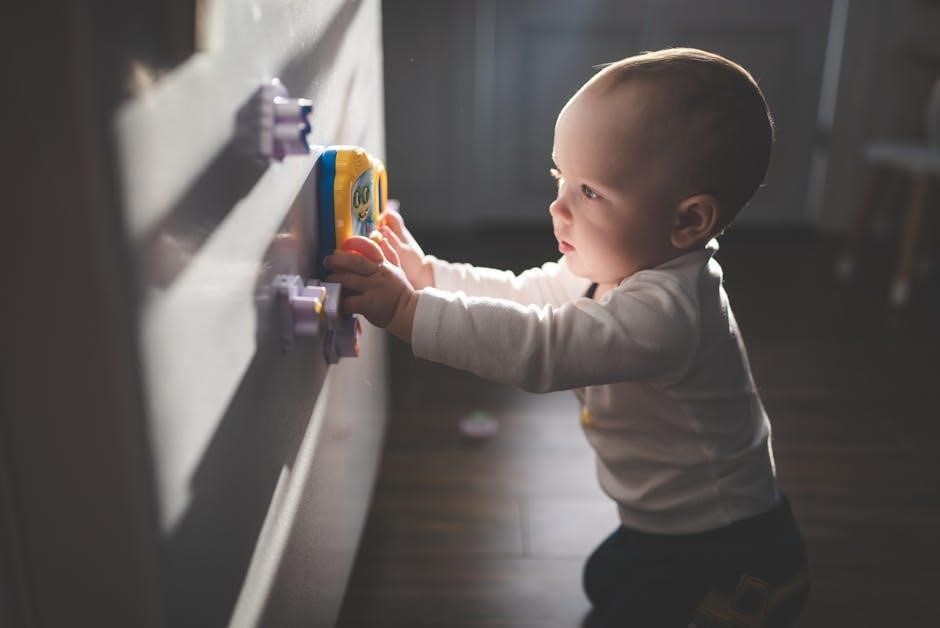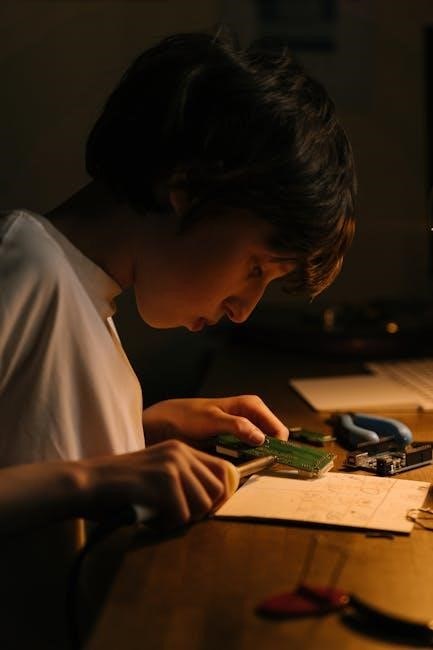The Hawaii Early Learning Profile PDF serves as a comprehensive guide for early childhood education in Hawaii, outlining research-based standards and expectations for young children’s knowledge and behavior. It emphasizes the importance of early learning in preparing children for future academic success and fostering holistic development.
- Provides a framework for educators and families to support early learning.
- Aligns with state and national education initiatives to ensure quality early childhood programs.
It is a vital resource for creating a strong foundation for Hawaii’s keiki, ensuring they thrive academically, socially, and emotionally.
Overview of the Document
The Hawaii Early Learning Profile PDF is a detailed resource outlining research-based standards for early childhood education. It provides expectations for children’s knowledge and behavior, ensuring alignment with state and national goals. The document supports educators, families, and caregivers by offering practical guidance for fostering early learning and development. It serves as a foundational tool for creating nurturing environments that promote academic and social readiness in young children.
Importance of Early Learning in Hawaii
Early learning in Hawaii is crucial for building a strong foundation for future academic success and lifelong skills. It ensures young children develop socially, emotionally, and cognitively, preparing them for school and beyond. Investing in early education supports Hawaii’s diverse communities, fostering accessibility and affordability for families. This emphasis aligns with state initiatives to create a nurturing environment for all keiki to thrive.
Background and Development of the Hawaii Early Learning Profile
The Hawaii Early Learning Profile was developed to establish consistent, research-based standards for early childhood education. It reflects the state’s commitment to fostering accessible, high-quality learning opportunities for young children, ensuring they are well-prepared for future success.
History of Early Childhood Education in Hawaii
Hawaii’s early childhood education has evolved significantly, with a strong emphasis on creating accessible, high-quality programs. The establishment of the Executive Office of Early Learning in 2012 marked a pivotal moment, followed by the appointment of Terry Lock as the state’s early childhood coordinator in 2014. This period saw increased focus on research-based standards, culminating in the release of the Hawaii Early Learning Profile in 2015, which set foundational expectations for young children’s development.
- Key milestones include policy reforms and the creation of dedicated early learning initiatives.
- These efforts reflect Hawaii’s commitment to improving early childhood education statewide.
Key Stakeholders Involved in the Profile’s Creation
The development of the Hawaii Early Learning Profile involved collaboration among key stakeholders, including the Executive Office of Early Learning, early childhood educators, state policymakers, and community organizations. These stakeholders contributed expertise and resources to ensure the profile aligns with Hawaii’s educational goals and supports young children’s development effectively.
- Early childhood educators provided insights into classroom needs.
- Policymakers ensured alignment with state education priorities.
- Community organizations offered feedback on accessibility and cultural relevance.
Key Components of the Hawaii Early Learning Profile PDF
The profile includes research-based standards, expectations for children’s knowledge and behavior, and guidelines for educators to support early learning through play-based and culturally responsive practices.
- Aligns with state and national early learning policies.
- Provides tools for assessing child development and readiness.
Research-Based Standards for Early Learning
The Hawaii Early Learning Profile PDF outlines research-based standards that define expectations for children’s knowledge and behavior, aligned with state and national early learning policies.
- Focuses on cognitive, social, emotional, and physical development.
- Emphasizes play-based and culturally responsive learning practices.
- Provides benchmarks for assessing child readiness and progress;
These standards ensure a consistent and equitable approach to early childhood education across Hawaii.
Expectations for Knowledge and Behavior in Young Children
The Hawaii Early Learning Profile PDF establishes clear expectations for young children’s knowledge and behavior, focusing on social-emotional skills, language development, and problem-solving abilities. These expectations are culturally responsive and aligned with research-based standards, ensuring children are well-prepared for school and future success. They emphasize holistic development, fostering independence, curiosity, and a love for learning while respecting Hawaii’s unique cultural context.
- Includes benchmarks for social-emotional growth and academic readiness.
- Encourages children to explore, create, and think critically.
- Supports families and educators in nurturing early learners.
Implementation Strategies for the Hawaii Early Learning Profile
The implementation of the Hawaii Early Learning Profile involves strategic coordination by the Executive Office of Early Learning, ensuring alignment with state policies and providing training for educators to effectively integrate the standards into early childhood programs.
- Focuses on professional development and resource distribution.
- Emphasizes partnerships between schools, families, and community stakeholders.
- Improves academic and social readiness.
- Empowers families with actionable insights.
- Aligns with state education goals.
- Regular assessments track children’s knowledge and behavioral growth.
- Feedback from educators and families informs continuous improvement.
- Data analysis evaluates program effectiveness and informs policy adjustments.
- Annual reviews and revisions align the profile with current research.
- Pilot testing new standards ensures practical applicability in Hawaii’s context.
- Collaboration between the Executive Office of Early Learning and stakeholders drives continuous enhancement.
- Improved academic and social readiness for young children.
- Enhanced collaboration between educators and families.
- Effective integration of research-based standards in classrooms.
- Educators highlight improved classroom engagement and developmental progress.
- Families express gratitude for tools that enhance their parenting strategies.
- Both groups emphasize the profile’s role in fostering a love for learning early in life.
- Targeted funding to establish new early learning centers.
- Community collaborations to enhance program accessibility.
- Emphasis on reaching underserved populations.
- Cultural integration into curriculum design.
- Technology-enhanced learning tools for engagement.
- Professional development for educators.
- Community events and workshops empower parents and caregivers.
- Partnerships with local organizations amplify outreach and support.
- Utilize social media, local events, and partnerships with community organizations.
- Focus on making early learning accessible and affordable for all families.
- Emphasize the role of caregivers in fostering a strong educational foundation.
- Workshops and resources empower parents to actively participate in their child’s education.
- Community events promote cultural awareness and inclusive early learning practices.
- Feedback mechanisms ensure families’ voices shape early learning strategies.
- Investing in early learning infrastructure and teacher training.
- Community collaborations to address barriers and improve outcomes.
- Increasing funding for early learning programs to reduce costs for families.
- Partnering with local communities to create accessible learning centers.
- Implementing outreach initiatives to reach underserved populations.
- Developing online learning tools for remote areas.
- Creating mobile learning units to reach underserved communities.
- Implementing culturally responsive teaching methods.
Role of the Executive Office of Early Learning
The Executive Office of Early Learning plays a pivotal role in implementing the Hawaii Early Learning Profile by developing and distributing research-based standards. It coordinates statewide efforts to ensure alignment with education policies and provides resources for educators. The office collaborates with stakeholders to create accessible early learning opportunities, supporting Hawaii’s keiki and their families through innovative and effective strategies.
Training and Support for Early Learning Educators
Training and support for early learning educators are crucial for effective implementation of the Hawaii Early Learning Profile. Professional development programs, workshops, and resources are provided to ensure educators are equipped with the latest research-based methods. These initiatives help educators create engaging learning environments, fostering children’s development and readiness for future academic success while aligning with state standards and policies.

Benefits of the Hawaii Early Learning Profile
The Hawaii Early Learning Profile enhances child development and school readiness by providing clear expectations and fostering a strong foundation for future academic success. It supports families and educators in promoting early learning, ensuring children are well-prepared for kindergarten and beyond.
Impact on Child Development and Readiness for School
The Hawaii Early Learning Profile significantly enhances child development by fostering essential skills in young children, preparing them for kindergarten and future academic success. It promotes social, emotional, and cognitive growth, ensuring children are well-rounded and ready to thrive in school. By aligning with research-based standards, the profile supports early learning programs in building a strong foundation for lifelong education and development.
Support for Families and Caregivers in Early Learning
The Hawaii Early Learning Profile provides vital support to families and caregivers by ensuring accessible and affordable early learning opportunities. It aligns with policies that enhance the quality of care, offering resources to help caregivers effectively support their children’s development. This initiative aims to empower families, fostering a nurturing environment that promotes the holistic growth of Hawaii’s keiki.
Alignment with State and National Early Learning Policies
The Hawaii Early Learning Profile aligns with state and national policies, ensuring comprehensive early learning initiatives. It supports policies making early learning accessible and affordable for families.
Hawaii’s Early Learning Policies and Goals
Hawaii’s early learning policies focus on increasing access to high-quality early childhood education, ensuring affordability, and fostering partnerships between families, educators, and communities. The state aims to provide equitable opportunities for all keiki, supporting their cognitive, social, and emotional development. These goals are reflected in the Hawaii Early Learning Profile, which outlines standards for early learning and behavior expectations.
Connection to National Early Childhood Education Initiatives
Hawaii’s early learning policies align with national initiatives, emphasizing high-quality education and equity. The state participates in federal programs and competitions, such as the Race to the Top, to secure funding and support for early learning. These efforts reflect a commitment to national standards while addressing Hawaii’s unique needs, ensuring keiki receive a strong foundation for future success.

Assessing the Effectiveness of the Profile
Evaluation methods ensure the profile meets research-based standards, with continuous updates to improve early learning outcomes for Hawaii’s children, aligning with state and national goals.
Evaluation Methods for Early Learning Outcomes
Evaluation methods for the Hawaii Early Learning Profile PDF include ongoing assessments, observations, and data analysis to measure child development progress. These methods ensure alignment with research-based standards and state goals.
These methods ensure the profile remains impactful, supporting Hawaii’s keiki in achieving school readiness and long-term success.
Continuous Improvement and Updates to the Profile
The Hawaii Early Learning Profile PDF undergoes regular updates to reflect best practices and research advancements. These updates are informed by feedback from educators, families, and stakeholders, ensuring the document remains relevant and effective in supporting early childhood education.
These efforts ensure the profile stays responsive to the evolving needs of Hawaii’s keiki and early learning systems.

Case Studies and Success Stories
The Hawaii Early Learning Profile PDF highlights successful implementations, showcasing improved educational outcomes for keiki and effective collaboration between educators and families in early learning initiatives.
Examples of Successful Implementation in Hawaii
The Hawaii Early Learning Profile PDF has led to successful implementations across the state, improving early childhood education outcomes. Programs have reported increased school readiness and better social-emotional development in children. Educators have effectively integrated the profile’s standards into daily practices, fostering a more cohesive learning environment. Families have also benefited from aligned resources, enhancing their ability to support their children’s early learning journey.
Testimonials from Educators and Families
Educators and families have praised the Hawaii Early Learning Profile PDF for its practical guidance and positive impact on child development. Many report improved readiness for school and enhanced social-emotional growth in children. Families appreciate the clear expectations, while educators value the alignment with their teaching practices, creating a cohesive learning environment that supports Hawaii’s keiki.
Future Directions for Early Learning in Hawaii
Hawaii aims to expand early learning access and integrate innovative approaches, ensuring equitable opportunities for all keiki while fostering partnerships to enhance early childhood education statewide.
Expanding Access to Early Learning Opportunities
Hawaii is focused on increasing access to early learning programs, ensuring affordability and availability for all families. By investing in early childhood education, the state aims to create equitable opportunities for keiki to thrive. Partnerships with local organizations and government initiatives are key to expanding these services, particularly in underserved areas. This effort supports the holistic development of children statewide.
These strategies aim to ensure every child in Hawaii has the chance to benefit from quality early learning experiences.
Innovative Approaches to Early Childhood Education
Hawaii is implementing innovative early learning strategies, blending cultural practices with modern educational methods. The state integrates technology and hands-on activities to engage young learners. Personalized learning plans and teacher training programs are also being introduced to enhance instructional quality. These approaches aim to foster creativity, critical thinking, and cultural awareness in children.
These innovations align with Hawaii’s goal of providing high-quality, equitable early childhood education statewide.

Supporting Policies and Funding for Early Learning
Hawaii’s early learning initiatives are supported by government grants and public-private partnerships, ensuring accessible and high-quality education for all children.
Government Initiatives and Funding Sources
Hawaii’s early learning programs are supported by state-funded initiatives and federal grants, ensuring access to quality education for all children. Governor Neil Abercrombie’s appointment of an early childhood coordinator highlights the state’s commitment to early learning reform.
Funding sources include competitive grants and public-private partnerships, aiming to enhance early learning opportunities and affordability for Hawaii’s families, aligning with the Hawaii Early Learning Profile’s goals.
Community Partnerships and Private Sector Support
Hawaii’s early learning initiatives are enriched through community partnerships and private sector support. Collaborative efforts between government agencies and private entities foster innovative approaches to education. Federal grants and competitive awards, such as the potential $50 million, enhance funding for early learning programs. These partnerships ensure that resources are maximized, providing accessible and high-quality early education for all families across the state.

Community Engagement and Awareness
Public awareness campaigns highlight the importance of early learning, engaging families and communities in Hawaii. Collaborative efforts with local organizations foster a shared commitment to early education.
Public Awareness Campaigns for Early Learning
Hawaii’s Executive Office of Early Learning promotes public awareness campaigns to educate families and communities about the importance of early childhood education. These initiatives aim to highlight the benefits of early learning and encourage participation in programs that support young children’s development.
These efforts ensure that Hawaii’s communities are informed and engaged in supporting early learning opportunities.
Engaging Families and Communities in Early Learning
Hawaii prioritizes family and community involvement in early learning through partnerships and outreach programs. These initiatives foster collaboration between educators, families, and local organizations to create supportive learning environments.
Such efforts strengthen connections and enhance overall early learning outcomes for Hawaii’s children.

Challenges and Solutions in Early Learning
Hawaii faces challenges like limited access to early learning programs and affordability. Solutions include government funding, partnerships, and innovative approaches to expand opportunities for young children.
Addressing Barriers to Early Learning Access
Hawaii faces challenges such as affordability and geographic accessibility to early learning programs. To address these, the state invests in funding, partnerships, and innovative solutions to expand access for families, ensuring equitable opportunities for all keiki to thrive.
These efforts aim to break down barriers and provide high-quality early learning experiences for Hawaii’s children.
Innovative Solutions to Common Challenges
Hawaii addresses early learning challenges through innovative solutions like technology integration and community partnerships. The state leverages digital platforms for remote learning and collaborates with local organizations to expand program accessibility.
These strategies aim to overcome barriers and improve early learning outcomes for all children.
